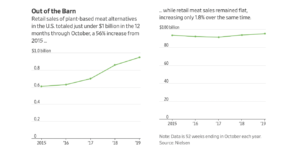Last week, Wall Street Journal writers Jacob Bunge and Heather Haddon reported that, “On a rainy September morning, a pair of cattle ranchers browsed the refrigerated meat cases at a Walmart Inc. store in Mandan, N.D., snapping cellphone photos of an unwelcome invader among the shrink-wrapped ground beef: Beyond Meat Inc. patties, made from pea protein and coconut oil. After a separate check at a nearby local supermarket, the ranchers headed to the North Dakota Department of Health. They showed officials the photos and warned of food-safety risks from mixing plant burgers with the traditional beef kind.
“Their message: Meatless burgers don’t belong on beef’s turf.
“The impromptu inspection by the ranchers—one of whom was Kenny Graner, president of the U.S. Cattlemen’s Association—is just one front in a growing war against their plant-based rivals. Cattle ranchers and their allies are pushing regulators to scrutinize alternative meat-makers, recruiting food scientists to test plant-based products for potential health risks, and ramping up countercampaigns to highlight beef’s nutritional benefits while comparing their rivals to dog food.”
The Journal article stated that, “Over the past two years, the beef industry has pushed legislation that restricts terms like ‘beef’ and ‘meat’ to the kind raised on the hoof, not products derived from plants or future ones developed using animal cells in labs. Various labeling laws are now on the books in 12 states and were considered this year in 15 others, with a federal bill introduced in October.”

“America’s Cattle Ranchers Are Fighting Back Against Fake Meat,” by Jacob Bunge and Heather Haddon. The Wall Street Journal (November 27, 2019).
Bunge and Haddon added that, “Plant-based alternatives amount to the equivalent of just 1% of the total volume of meat sold in the U.S., according to Nielsen. But some beef producers see an existential threat in the growth of meat-alternative makers like Beyond and Impossible Foods Inc.
“For a hint at the threat they face, they point to dairy farmers’ years-long losing battle against almond, soy and other imitation milks that have captured about 10% of sales, while consumption of traditional cows’ milk has declined.”

